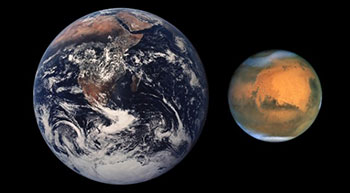NASA is set to launch MAVEN (Mars Atmosphere and Volatile Evolution), a small scientific satellite, to do some chemical meter-reading in the Martian atmosphere.
“MAVEN will provide key knowledge for understanding how all atmospheres, even our own, have changed since the formation of the solar system,” says Paul Withers, a College of Arts & Sciences assistant professor of astronomy, who is one of a BU trio working on the project. Unlike studies of quicker, human-induced climate change, MAVEN will study “the longer, natural changes that occur as every planet’s atmosphere slowly boils away.”
Billions of years ago, scientists believe, water coursed over the Red Planet’s face. Today, its arid surface may be a textbook on how solar heat not only evaporated that liquid, but also thinned the atmosphere by bleeding off nitrogen and carbon dioxide.
When MAVEN takes off from Florida’s Cape Canaveral today, Withers will attend his first space launch, with “fingers crossed that all goes well,” he says. He’ll be joined by John Clarke and Michael Mendillo (GRS’68,’71), both CAS astronomy professors. Clarke, director of BU’s Center for Space Physics, has been part of MAVEN’s planning for eight years and now works with its instrument team.
MAVEN’s goal is to “detail the processes that lead to atoms and molecules escaping into space,” Clarke says, “so that we can extrapolate back in time to tell what the conditions were like when Mars was young.” Erosion channels on the planet suggest surface water earlier in its history, and the thicker atmosphere and warmer climate that would have gone with it, meaning, he says, “Mars may have begun its history looking much more like Earth,” and possibly hosting some form of life.
Another BU study was the first to tie simultaneous ionospheric disruptions on Earth and Mars to a large solar flare, Mendillo says, showing that the sun’s effects on Mars could be instructive for the future of Earth’s atmosphere.
MAVEN is the first project of its kind, says NASA: rather than crawl on the surface, the satellite will hang out in orbit, using its sensitive instruments “to pinpoint trace amounts of chemicals,” according to the space agency. Clarke says BU is the only New England institution assisting the project, which is being led by the University of Colorado at Boulder.
MAVEN will reach Mars in 10 months and then take readings for two years (that’s by Earth’s calendar; only one Martian year will pass).
Source: science daily
B.N

